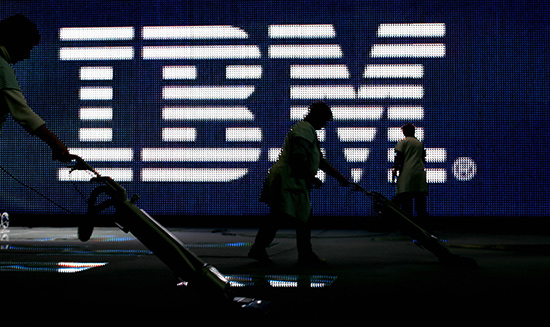IBM駁斥谷歌“量子霸權”說

|
所謂“量子霸權”,是指量子計算機在執(zhí)行某項任務上的效能遠遠超過了傳統(tǒng)計算機。最近,谷歌研究人員聲稱該公司的量子計算機已經(jīng)在特定領域實現(xiàn)了“量子霸權”。對谷歌的這種說法,IBM公司的科學家在本周一晚間予以了駁斥,稱“這個目標還沒有實現(xiàn)”。 谷歌這一具有里程碑意義的成就是在上個月曝光的。據(jù)《財富》雜志當時報道,有一篇還沒正式刊發(fā)的論文意外地從美國宇航局的官網(wǎng)上泄露了出來——美國宇航局也是谷歌的合作伙伴之一。不過谷歌對這個可能具有歷史意義的成就卻只字未提,這讓大家不禁猜想,谷歌或許是與某家科學雜志簽了獨家發(fā)布協(xié)議,在某個特定日期到來之前,還無法向外界透露更多細節(jié)——而這一天可能已經(jīng)不遠了。 谷歌的這篇“官泄”論文稱,該公司的研究人員在一臺量子計算機上進行了一次特殊的運算,耗時約3分20秒。而一臺最先進的傳統(tǒng)超級計算機“大約需要1萬年才能完成同樣的任務”。 IBM公司近日駁斥了谷歌的斷言。設在紐約州約克鎮(zhèn)高地的IBM研究部門的幾位科學家表示,利用高等數(shù)學和一系列復雜的計算技術,“只需要兩天半時間,就能對同一任務進行完美模擬,而且精確度要好得多。”而且這還是“保守的、最差的估計。” IBM的研究團隊表示,他們估計的運算時間,是基于對一臺53量子比特的普通量子計算機的模擬——谷歌的量子計算機就是53量子比特的。如果需要模擬一臺54量子比特的量子計算機,則要耗時5.8天。 IBM團隊還表示:“據(jù)我們估計,通過進一步的改進,傳統(tǒng)計算機的模擬成本還可以進一步降低。” IBM實際上并沒有執(zhí)行它提出的運算理論。它只是在網(wǎng)站上發(fā)表了一篇科研論文,文中寫道,該公司“提供了一個對該模擬策略的詳細描述”。Arxiv是一個論文預印本存儲庫,科學家們可以在同行評審前上傳論文的預印本。 IBM的逆向分析必須借助全球最強大的超級計算機Summit。這是一臺由IBM設計的超級計算機,主機位于美國橡樹嶺國家實驗室。我們現(xiàn)在還不清楚這臺超級計算機怎樣能模擬更多量子比特的運算。畢竟量子計算機每增加一個量子比特,量子計算的性能和復雜性就會呈指數(shù)級增長。 IBM的論文將谷歌的量子線路分解為一些“子線路”,從而使傳統(tǒng)計算機更易于執(zhí)行模擬任務。該論文利用了一些高等數(shù)學的原理——比如張量網(wǎng)絡原理,它可以同時表示多個數(shù)字系統(tǒng),從而模擬“糾纏”等復雜的量子現(xiàn)象。該論文還指出,要想完成這次想象中的巨量運算,還需要為Summit超級計算機增配充足的硬盤存儲空間。 IBM的科學家在一篇博客文章中還進一步質疑了“量子霸權”這個術語:“我們已經(jīng)有充分證據(jù)表明,‘量子霸權’這個詞正在被廣泛地誤解,并且造成了越來越多的困惑。所以我們建議不要使用這個術語,并且真誠地征詢業(yè)界的意見,看是否應該取消這個術語。” 目前,各大科技企業(yè)都在爭相開發(fā)量子計算機的底層硬件,谷歌和IBM是其中的兩個領跑者,也是激烈的競爭對手。專家們相信,量子計算將帶來科學技術的巨大進步,將造福包括藥品開發(fā)、人工智能和化學建模在內(nèi)的多個領域。 IBM的研究人員寫道:“谷歌的實驗出色地證明,基于超導技術的量子計算已經(jīng)取得了一定進展(谷歌和IBM自己都采用了同樣的硬件實現(xiàn)方法)。但它不應該被視為量子計算機比經(jīng)典計算機更具有‘優(yōu)勢’的證據(jù)。” 谷歌的一位發(fā)言人拒絕對此發(fā)表評論。(財富中文網(wǎng)) 譯者:樸成奎 |
IBM scientists have rejected Google researchers’ claim to have achieved “quantum supremacy,” a demonstration that a quantum computer can vastly outperform a traditional one on a particular task. They contend in a blog post published Monday evening that “the goal has not been met.” Google’s supposed milestone achievement became public last month when a preprint scientific paper accidentally leaked on the website of NASA, a collaborator, as Fortune reported at the time. Google has said nothing about the potentially historic experiment since then, lending credence to whispers that its researchers are bound to silence under the terms of a news embargo by a major science journal, unable to disclose more information until a certain date which is presumed to be imminent. Google’s leaked paper claimed that its researchers ran a special computation on a quantum computer that took three minutes and 20 seconds, whereas a state-of-the-art supercomputer would have taken “approximately 10,000 years to perform the equivalent task.” IBM contradicts Google’s assertion. Several scientists within IBM’s research division, based in Yorktown Heights, N.Y., counter that, using advanced mathematics and a collection of sophisticated computing techniques, “an ideal simulation of the same task can be performed in 2.5 days and with far greater fidelity”—a conclusion the team calls “a conservative, worst-case estimate.” This time estimate holds for simulating the output of a quantum machine, such as Google’s, bearing 53 qubits, the quantum equivalent of an ordinary computer’s bits, IBM’s team says. Simulating the work of a 54-qubit machine would take 5.8 days, it says. “We expect that with additional refinements the classical cost of the simulation can be further reduced,”the IBM team adds. IBM did not actually perform the calculations it proposes. The company instead provided “a detailed description of the proposed simulation strategy,” it writes, in a new scientific paper published on Arxiv, a digital preprint repository where scientists can upload papers prior to peer review. IBM’s contrarian analysis hinges on using the world’s most powerful supercomputer, Summit, an IBM-designed machine which is housed at Oak Ridge National Laboratory. It remains unclear how the machine would handle the simulation of more qubits, each of which increases the power and complexity of quantum calculations exponentially. IBM’s paper breaks down the simulation of Google’s quantum circuit into “subcircuits,” making the task easier for a classical computer to perform. The paper proposes using advanced mathematical concepts—such as tensor networks, which can represent multiple systems of numbers at once—to mimic the behavior of weird quantum phenomena such as “entanglement.” The paper also proposes supplementing the Summit supercomputer’s main memory banks with ample disk storage to enable it to accomplish the hypothetical computational feat. In their blog post, the IBM scientists further take issue with the term “quantum supremacy” and its pursuit. They write, “since we already have ample evidence that the term ‘quantum supremacy’ is being broadly misinterpreted and causing ever growing amounts of confusion, we recommend that it not be used and sincerely ask the community whether it is time to retire the term.” Google and IBM are two frontrunners—and fierce competitors—in big business’ race to develop hardware underlying quantum computers. Experts believe quantum computing will lead to major scientific and technological advances, including improved drug discovery, enhanced artificial intelligence techniques, and chemical modeling. “Google’s experiment is an excellent demonstration of the progress in superconducting-based quantum computing,” IBM’s researchers write, referring to the hardware approach both Google and itself are taking, “but it should not be viewed as proof that quantum computers are ‘supreme’ over classical computers.” A Google spokesperson declined to comment. |











